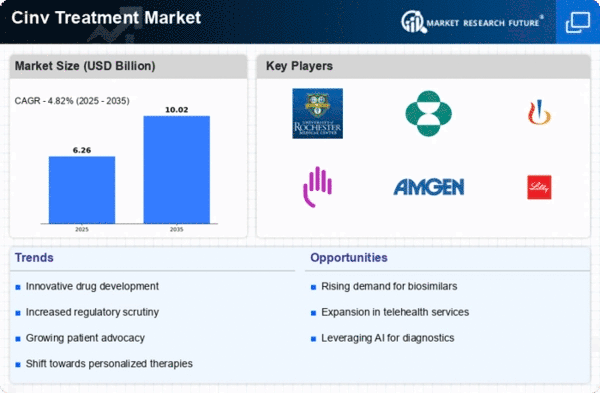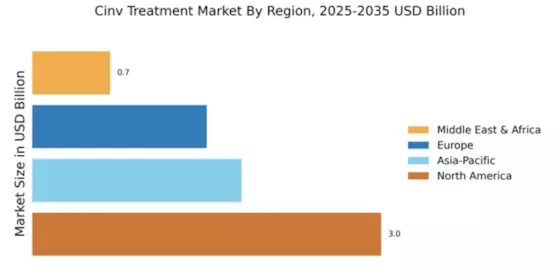Rising Incidence of Cancer
The Global CINV Treatment Market Industry is experiencing growth due to the increasing incidence of cancer worldwide. According to the World Health Organization, cancer cases are projected to rise significantly, leading to a higher demand for effective treatment options. As more patients undergo chemotherapy, the need for antiemetic therapies to manage chemotherapy-induced nausea and vomiting becomes critical. This trend is expected to contribute to the market's expansion, with the market value anticipated to reach 5.97 USD Billion in 2024. The growing patient population necessitates innovative treatment solutions, thereby driving investment in research and development within the Global CINV Treatment Market Industry.
Growing Geriatric Population
The aging population is a crucial driver of the Global CINV Treatment Market Industry. As individuals age, they are more susceptible to cancer, leading to an increased incidence of chemotherapy treatments among older adults. This demographic shift necessitates tailored antiemetic therapies that address the unique needs of geriatric patients. The market is poised for growth as healthcare systems adapt to provide effective CINV management for this population. With projections indicating a market value of 5.97 USD Billion in 2024, the growing geriatric population is likely to play a significant role in shaping the future landscape of the Global CINV Treatment Market Industry.
Increased Awareness and Education
The Global CINV Treatment Market Industry is benefiting from heightened awareness and education regarding CINV among healthcare providers and patients. Educational initiatives aimed at oncology professionals emphasize the importance of recognizing and managing CINV effectively. As awareness grows, patients are more likely to seek treatment options, leading to increased demand for antiemetic therapies. This trend is further supported by patient advocacy groups that promote understanding of CINV and its impact on quality of life. Consequently, the market is expected to expand as more patients receive appropriate care, thereby enhancing the overall landscape of the Global CINV Treatment Market Industry.
Advancements in Treatment Modalities
Innovations in treatment modalities are propelling the Global CINV Treatment Market Industry forward. The introduction of new antiemetic agents, such as neurokinin-1 receptor antagonists and cannabinoids, has enhanced the management of CINV. These advancements provide healthcare professionals with a broader array of options to tailor treatments to individual patient needs. Moreover, clinical trials continue to explore the efficacy of combination therapies, which may improve patient outcomes. As the market evolves, these advancements are likely to attract further investment, contributing to the projected market growth to 10.0 USD Billion by 2035, reflecting a compound annual growth rate of 4.81% from 2025 to 2035.
Regulatory Support for New Therapies
Regulatory bodies are increasingly supporting the development of new therapies within the Global CINV Treatment Market Industry. Initiatives aimed at expediting the approval process for innovative antiemetic treatments are becoming more common. This regulatory support not only encourages pharmaceutical companies to invest in research and development but also facilitates quicker access to effective therapies for patients. As a result, the market is likely to see a surge in new product launches, which could significantly enhance treatment options available to patients. This dynamic environment is expected to contribute to the overall growth trajectory of the Global CINV Treatment Market Industry.

















